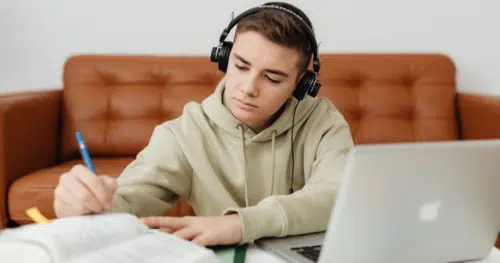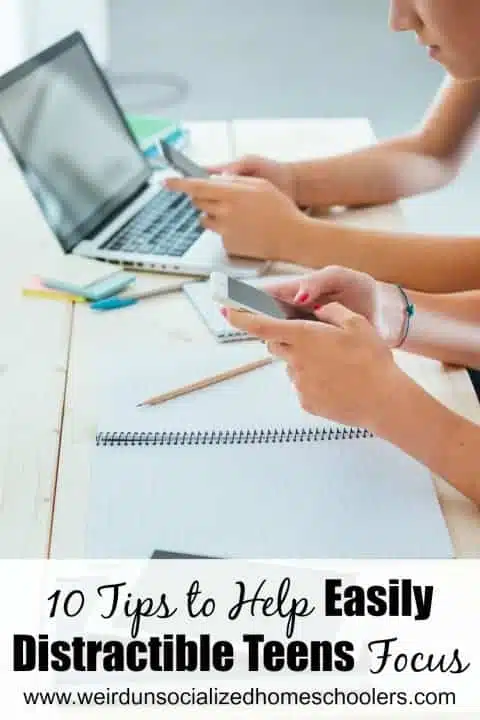10 Tips to Help Easily Distractible Teens Focus
If your middle or high school student struggles to stay on task, try these tips to help easily distractible teens focus.
There are a lot of things vying for our teens’ attention these days. Most homeschooled teens complete some, if not all, of their schoolwork on a laptop or tablet. And, they likely do so with a smartphone in their pocket or on the table beside them.
Couple those distractions with common attention difficulties such as ADD and it’s easy to see why it’s difficult for many teens (and adults, if we’re being honest!) to focus and work well independently.

10 Tips to Help Easily Distractible Teens Focus
If you have an easily distractible teen, try these tips to help him or her focus.
1. Limit Distractions
One of the best ways to help teens focus, right out of the gate, is to limit distractions. My one big no-no is watching TV while doing schoolwork. It’s also wise to limit social media and texting. Have a designated spot for phones and electronic devices during school time.
I’m not as strict about that as I used to be, but for a while we had our designated spot for phones. I let my teens take a 5-10 minute break between subjects to read and reply to texts or check their favorite social media sites. Those SnapChat streaks were important, y’all.
WriteShop has some fantastic ideas for limiting social media during school hours. (They’re helpful for easily distracted parents, too. {ahem}
2. Try Workboxes
I know workboxes were all the rage 10 years or so ago. I’m not sure how popular they are these days, but my oldest found our modified workbox system helpful all the way through high school. Because it was a very visual system with each subject in a separate folder, it was easy for her to see exactly what she had completed and what still needed to be done.
We never used the system as its creator envisioned, but the idea behind it was certainly helpful. We used an old milk crate, but a file folder box could work great as well. Each subject had its own hanging file folder with all the books and paper supplies my daughter needed for that subject.
She arranged the folders in the order that she wanted to complete them, moving completed folders to the back until she finished that day’s work. Then, we’d load it up again the next morning.
As a bonus, the system was easy to transport if we needed to take school on the road for an appointment or if she wanted to head out to the back porch when the weather was nice.

3. Create a Study Area
All teens can benefit from a dedicated study area, but it’s especially helpful for highly distractible teens. A study area doesn’t have to be elaborate, it just needs to be located away from sources of distraction.
It also needs to be well-stocked with the items that kids need for school such as paper, pens, pencils, a pencil sharpener, eraser, and books. This eliminates the distraction of searching for all those things and getting sidetracked in the process.
For some teens, their study area may be a desk in the family room or in the home office area if you have one. When my oldest used workboxes, I attached a zippered pencil bag designed for a 3-ring binder to her work crate with binder rings. Everything that couldn’t go into a hanging folder went into the pencil bag, so that it was all easily accessible.
4. Use a Planner
Teaching your teens to use a planner to schedule their assignments is great practice for college or the workforce and a helpful tool for easily distractible teens.
Get your student a planner so that she can write out her schedule and mark assignments off as they’re completed. We love the customizable student planners from A Plan in Place.
My younger kids also really liked the weekly plan sheet that I printed off for them from the Donna Young website.
Some teens may do just fine with a spiral notebook or a composition book where they can write out their assignments and mark them off as they are completed.
5. Provide Accountability
It’s wise to have a method for holding students, particularly highly distractible teens, accountable. Meet with them daily or weekly to review their assignments, making sure that they’re getting completed.
At our house, I check math daily since it tends to be the problem subject (both in mastery and getting completed). On Thursdays, I check everything else and circle any assignments that may have been missed. We use Fridays as a catch-up day, so that works well for us.
Set consequences in place for missed assignments or incomplete work. Maybe it’s just me, but this was always difficult. It was easy to say, “Oh, well, we’ll just get that done next week.”
That doesn’t work well in college or the workforce. Kids need to realize that there are consequences for not doing what’s expected of them before those consequences are a failed class that you’re paying tuition for or job termination.
Discuss with your teen the expectations ahead of time. You can even ask them to help you brainstorm reasonable (to both of you) consequences. Then, once you’ve come up with some guidelines you both (or, you know, maybe just you) feel are fair, stick with those guidelines.
The built-in catch-up day on Fridays was extremely helpful for us. If the kids got all their work done during the week, Fridays were light school days with maybe a field trip or some hands-on learning. If they didn’t get everything completed, Friday was pretty much a regular school day. Having a light day at the end of the week was incentive enough for them to keep everything caught up during the week most of the time.

6. Establish a Routine
A regular routine helps with distractibility so much because it helps kids know what they need to do and when so that tasks don’t get overlooked as easily.
Some kids find that timers also help because they can focus more easily on a task if they know it’s only for a set amount of time. Others find that they like the challenge of completing an assignment before the timer goes off.
We are not a homeschooling family with a strict schedule, but we do have a predictable routine. My kids like to tackle the lighter subjects before lunch and leave the more thought-intensive for the afternoons when they’re more awake.
If you have kids who flourish with a routine, you might want to consider a sticky note schedule to help them focus on the task at hand. Write each subject or assignment on a sticky note that your teen can toss once that subject or assignment is complete. That’s a good way for visual kids to stay focused on what still needs to be done.

7. Noise-Canceling Headphones
A good pair of noise-canceling headphones can be expensive – but they can also be oh so worth it. I love listening to the ambient background noise of Coffitivity, but some kids work well with music. Let your teens choose what works best for them as long as it’s effective and not more distracting than the background noises you’re trying to eliminate.
8. Take Regular Breaks
Distractible kids of all ages can benefit from frequent breaks. Ten or fifteen-minute breaks between assignments tends to work well for most teens. It’s also helpful to stagger more attention-draining assignments with more enjoyable ones.
Your music-loving teen might enjoy playing guitar for a while after completing his math assignment, while your bookworm is happy to do her reading for English lit after that intense chemistry assignment.
It might help keep the flow of your day going better to get two or three subjects knocked out before taking a longer break, rather than small breaks between each subject. Don’t be afraid to experiment to see what works best for your family.

9. Try a Stress or Exercise Ball
For some kids, having a fidget object helps keep their minds busy. My oldest focuses much better on videos or lectures when she’s knitting. Some kids find pencil-tapping helpful for focus (often much to the annoyance of the people around them). A stress ball can be a fantastic – and quiet – alternative.
Another possibility to consider is an exercise ball. Sometimes the little bit of bounce they offer is enough fidgeting for distracted minds to focus. If it turns out that an exercise ball is helpful for your teen, you might consider a chair base for it that they can use at their desk or the kitchen table.
10. Encourage Healthy Habits
Finally, keep in mind that diet, exercise, and sleep habits can play a huge role in distractibility level. Make sure your teen is eating well and getting adequate rest and some physical activity each day.
Getting out for a walk around the block can be a great way to spend one of your breaks, getting some fresh air and exercise.
Try some or all of these tips to help your distractible teen focus. If you suspect that he or she suffers from ADD or ADHD, check with your doctor. While these issues are often over-diagnosed in our society, kids who truly deal with them can greatly benefit from medication and/or changes in their diet.
What do you find helps your teen to focus more effectively?
Kris Bales is a newly-retired homeschool mom and the quirky, Christ-following, painfully honest founder (and former owner) of Weird, Unsocialized Homeschoolers. She has a pretty serious addiction to sweet tea and Words with Friends. Kris and her husband of over 30 years are parents to three amazing homeschool grads. They share their home with three dogs, two cats, a ball python, a bearded dragon, and seven birds.




Just wanted to take a moment to say that at your recommendation I bought The Plan in Place Planners for my kids. They have been so helpful! We absolutely enjoy having them and it has made homeschool planning/record keeping a lot easier for me.
Yay! I’m so glad that you enjoy the planners and have found them helpful. We’re huge fans!
My 16 yr old has ADHD, and I’ve found that he gets distracted much less if he does his work at night. He’s able to focus more, and the house is a bit quieter. These are great ideas. Pinning this to my ADHD board!
Yes! Both of my girls (my graduate and my 9th grader) have found that they often focus better at night.
Love it!!! So cute and creative!
Any ideas for help wihile in class for focusing?? Middle school age??